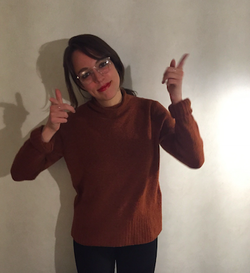
Hi, I'm Becca. I am the non-fiction book critic of the Washington Post, an editor at The Point, and a contributing editor at The Boston Review . My essay collection, All Things Are Too Small, was published Metropolitan Books in the US and Virago in the UK in April 2024. The New York Times called it "splendidly immodest" and "exhilarating" and The Guardian called it "bracing and brilliant." It was a New York Times editors' pick and a New Yorker weekly recommendation. Finally, I am also a PhD candidate (on indefinite hiatus) in philosophy at Harvard, but i remain perhaps delusionally convinced that someday I will finish my dissertation. These days I live in Washington, DC, with this person, whom I love. Here you can find all of my Washington Post pieces, which will come out each week, generally speaking.
To keep up with my writing/rantings, subscribe to my substack here. As a writer: I have contributed essays, book reviews, and the occasional art review to publications like The TLS, The Nation, The New York Times Book Review, The New Yorker, The Atlantic, Liberties, Bookforum, Art in America, The Yale Review, The Baffler, and more. These days, I write mostly for the Washington Post about non-fiction, but occasionally I write essays on fiction and whatever else for other venues. I am the winner of the first annual Robert B. Silvers Prize for Literary Criticism (see more here) and the 2023 Nona Balakian Citation for Excellence in Reviewing (see more here). In 2017, I was a finalist for a National Magazine Award in the essays/criticism category. A few authors I especially love are Joseph Roth, Italo Svevo, Henry James, Henry Green, Heinrich von Kleist, Marie de France, and Norman Rush. My agent is Anna Sproul-Latimer of Neon Literary. As a (lapsed?) philosopher: I am primarily interested in aesthetics (especially aesthetic value and its relationship to other types of value), the philosophy of love and sex, and the history of German philosophy, especially Martin Heidegger, although I have increasingly consuming secondary interests in political philosophy. In "The Good, the Bad, and the Ugly," published in The British Journal of Aesthetics, I defend aestheticism, the view that aesthetic value is sometimes a partial grounds of moral value. I describe aestheticism in more detail in a chapter in the Oxford Handbook of Ethics and Art. If I ever get around to completing it, my dissertation will be about some combination of the following: what it is to be a beautiful person, why evolutionary psychologists are wrong about human beauty, the ethics of exclusionary romantic/sexual/aesthetic preferences, and what role the state should play in ameliorating inequitable distributions of intimate "goods." I hold a first-class MPhil in the history and philosophy of science from the University of Cambridge and a B.A., summa cum laude with high honors, from Dartmouth College, where I studied philosophy & German (and cultivated an enduring distaste for fraternities). I receive many emails asking for advice about graduate school applications. I have answered some frequently asked questions on this page. As I note there, I do not consider myself an expert in how to write a successful graduate school application, and I urge all prospective grad students to consult resources online, as well as supervisors who have served on admissions committees, rather than me! Before the pandemic, I followed Hegel in regarding nature as geistlos, but now, like any good Heideggerian, I am a big fan of hiking. Here I am in the Berkshires, which I love
|
|
Some people speak like writers, but the Czech author Bohumil Hrabal writes like a talker. “I inhale images and then exhale them,” he once told an interviewer. It is fitting that much of Hrabal’s prose was heard before it was read: throughout the late nineteen-forties and fifties, when Hrabal worked as a clerk, an insurance agent, a travelling salesman, a stagehand, a foundry foreman, and a compactor of wastepaper in a recycling plant, he did not publish any of his eccentric stories in mainstream venues. Instead, he read them aloud to a handful of underground literati assembled in pubs. The few works he managed to have printed appeared only in samizdat. Read more here.
1 Comment
but it's only available in print. Email me for a PDF if you like!
A girl announces that she has decided to major in philosophy. A man replies, “That’s good, because they just opened up that philosophy factory in Green Bay.” This piece of joking dialogue comes from a 1999 episode of That Seventies Show—yet it remains sufficiently au courant to bear recycling in the kind of webcomics my friend sent me when I decided to study philosophy in college. The joke is not only that philosophy majors end up jobless (as, in fact, do majors in every other field). It is also that philosophy lacks the solidity that we might think is the whole measure of reality. It is also that things that can’t be crafted in factories can’t make material contributions to the world. Biologists brew medicines, and engineers make machines. Even economists trade in constructs with tangible power. But as Karl Marx put it in his “Eleventh Thesis on Feuerbach” (1845), long before That Seventies Show loomed on even the distant horizon, “Philosophers have only interpreted the world.… The point, however, is to change it.”
Of course, Marx is one of the best advertisements for philosophy’s real-world influence. And it is a myth that all you can do with a philosophy degree is more philosophy: As I am always tripping over myself to assure my students, undergraduate philosophy majors get, on average, the highest LSAT and verbal GRE scores. They even get higher GMAT scores than economists, computer scientists, and chemists! Still, the fact that a philosophy degree enables students to flee to more lucrative pastures is hardly a recommendation for philosophy itself. Read more here or in print. |
Archives
June 2022
Categories |

 RSS Feed
RSS Feed